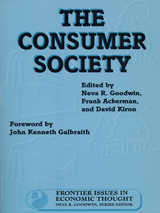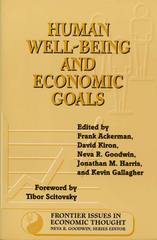
The developed countries, particularly the United States, consume a disproportionate share of the world's resources, yet high and rising levels of consumption do not necessarily lead to greater satisfaction, security, or well-being, even for affluent consumers.
The Consumer Society provides brief summaries of the most important and influential writings on the environmental, moral, and social implications of a consumer society and consumer lifestyles. Each section consists of ten to twelve summaries of critical writings in a specific area, with an introductory essay that outlines the state of knowledge in that area and indicates where further research is needed. Sections cover:
- Scope and Definition
- Consumption in the Affluent Society
- Family, Gender, and Socialization
- The History of Consumerism
- Foundations of Economic Theories of Consumption
- Critiques and Alternatives in Economic Theory
- Perpetuating Consumer Culture: Media, Advertising, and Wants Creation
- Consumption and the Environment
- Globalization and Consumer Culture
- Visions of an Alternative
The Consumer Society is an essential guide to and summary of the literature of consumption and will be of interest to anyone concerned with the deeper economic, social, and ethical implications of consumerism.

What are the ends of economic activity? According to neoclassical theory, efficient interaction of the profit-maximizing "ideal producer" and the utility-maximizing "ideal consumer" will eventually lead to some sort of social optimum. But is that social optimum the same as human well-being? Human Well-Being and Economic Goals addresses that issue, considering such questions as:
- Does the maximization of individual welfare really lead to social welfare?
- How can we deal with questions of relative welfare and of equity?
- How do we define, or at least understand, individual and social welfare?
- And how can these things be measured, or even assessed?
Human Well-Being and Economic Goals brings together more than 75 concise summaries of the most significant literature in the field that consider issues of present and future individual and social welfare, national development, consumption, and equity. Like its predecessors in the Frontier Issues in Economic Thought series, it takes a multidisciplinary approach to economic concerns, examining their sociological, philosophical, and psychological aspects and implications as well as their economic underpinnings.
Human Well-Being and Economic Goals provides a powerful introduction to the current and historical writings that examine the concept of human well-being in ways that can help us to set goals for economic activity and judge its success. It is a valuable summary and overview for students, economists, and social scientists concerned with these issues.
READERS
Browse our collection.
PUBLISHERS
See BiblioVault's publisher services.
STUDENT SERVICES
Files for college accessibility offices.
UChicago Accessibility Resources
home | accessibility | search | about | contact us
BiblioVault ® 2001 - 2024
The University of Chicago Press









